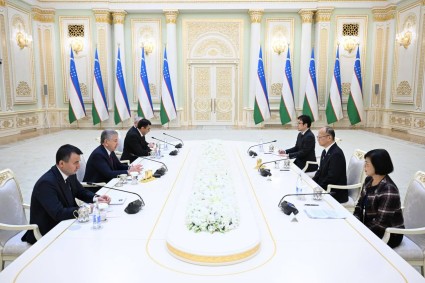In 2000-2015, the electricity consumption in Uzbekistan increased from 46.8 billion kWh to 57.5 billion kWh. It is estimated that by 2020 the country will consume by 25% more or 71.8 billion kWh of electricity. The current installed capacity of the country's power plants is 12,994 MW, including 12,514 MW of installed capacity of 39 thermal and hydroelectric power plants of SJSC Uzbekenergo.
Meanwhile, Uzbekistan has estimated potential of solar, wind and hydro energy at over 530 billion kWh, 520 billion kWh and 1,800 billion kWh of installed capacity respectively. The World Bank Group supports the Government of Uzbekistan in developing renewable energy policy and investments that will contribute to the country’s economic growth.
On 5-6 December, Tashkent hosts a workshop on renewable energy (RE) policy development jointly organized by the Government of Uzbekistan and the World Bank Group (WBG) in partnership with the International Renewable Energy Agency (IRENA). The event is attended by around 80 representatives of ministries and state agencies, state energy companies, international organizations, expert and academic circles concerned.
The purpose of the workshop is to support the Government’s efforts in introduction of RE in the country through discussion of best practices in development of RE strategy, policy, regulations, institutional measures, modern technologies, and project preparation and implementation adopted around the world, including cases of the Latin American, African and South Asian states. The event also contributes to discussion on development of RE roadmap in Uzbekistan to assist the Government in implementation of the Action Program on Renewable Energy Development for 2017-2021 adopted in May 2017, and also to promote private sector investments in renewable energy development.
“Why RE development is important for Uzbekistan? Firstly, it will ensure the country’s energy security, by helping diversify the energy mix and improve the long-term reliability of supply. Secondly, it is more economically efficient as it reduces the use of natural gas and coal for power production, which have a high opportunity cost. Thirdly, introduction of RE also represents new business opportunities as it creates an industry with new jobs. Fourthly, there are environmental and health benefits related to RE as it reduces fossil fuel combustion detrimental for environment and human health. Last but not least, it would help the country’s commitment to address the climate change challenges”, says Sameer Shukla, Practice Manager of World Bank’s Energy and Extractives Global Practice.
The Government has identified introduction of RE among other priorities under the Strategy of Actions on the Five Priority Areas of Development of Uzbekistan for 2017-2021. The World Bank Group supports the efforts of the Government to increase renewables’ share in power production from 12.7% in 2016 to 19.7% by 2025. For example, in 2015 development of a Wind Atlas of Uzbekistan and pre-feasibility studies for wind project sites were supported under a World Bank-financed project. The Atlas proves that the country possesses significant wind resources that are suitable for development of commercially feasible large-scale wind power farms in selected regions of the country.
During the workshop the WBG, the IRENA, local and international experts will deliver a number of presentations and will have a fruitful exchange with the event participants on the following topics:
• Legal/institutional aspects, including legal and regulatory framework, and institutional responsibilities related to RE;
• Strategy for scaling-up, including target setting, investment planning, different models for development, funding strategy and procurement strategy, private financing and procurement options, policy incentives for renewables and carbon pricing;
• Technological aspects, including RE technology options, resource assessment and mapping for renewables (and estimated cost), grid integration, and R&D;
• Preparation and implementation of bankable projects on RE, including required assessments, risk allocation, financial structuring, modeling, investor roadshow, contractual arrangements, procurement arrangements, logistics, environmental and social considerations, public communication, and training.
The WBG experts will also speak about financial, advisory and insurance services support that it is ready to provide to the Government and private sector to assist with implementation of promising RE projects in the country.
In Uzbekistan, the World Bank currently supports the implementation of 16 projects, which are worth of around US$2 billion. Those projects cover such priority areas as agriculture and water resources management, energy, transport, healthcare, education, urban development, water supply and sanitation.













